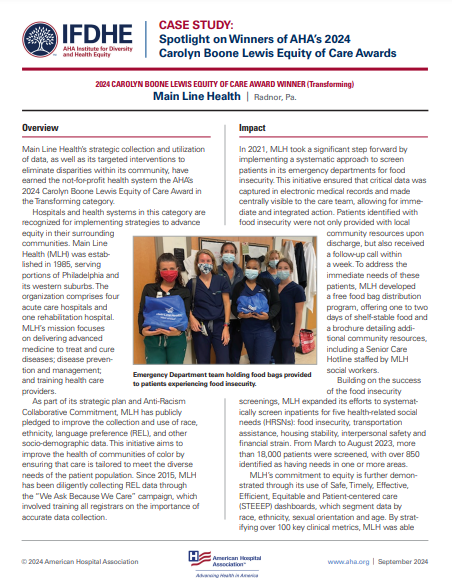2024 Equity of Care Awards Case Study: Main Line Health
2024 Equity of Care Awards Winner (Transforming)
Overview
Main Line Health’s strategic collection and utilization of data, as well as its targeted interventions to eliminate disparities within its community, have earned the not-for-profit health system the AHA’s 2024 Carolyn Boone Lewis Equity of Care Award in the Transforming category.
Hospitals and health systems in this category are recognized for implementing strategies to advance equity in their surrounding communities. Main Line Health (MLH) was established in 1985, serving portions of Philadelphia and its western suburbs. The organization comprises four acute care hospitals and one rehabilitation hospital. MLH’s mission focuses on delivering advanced medicine to treat and cure diseases; disease prevention and management; and training health care providers.
As part of its strategic plan and Anti-Racism Collaborative Commitment, MLH has publicly pledged to improve the collection and use of race, ethnicity, language preference (REL), and other socio-demographic data. This initiative aims to improve the health of communities of color by ensuring that care is tailored to meet the diverse needs of the patient population. Since 2015, MLH has been diligently collecting REL data through the “We Ask Because We Care” campaign, which involved training all registrars on the importance of accurate data collection.
Impact
In 2021, MLH took a significant step forward by implementing a systematic approach to screen patients in its emergency departments for food insecurity. This initiative ensured that critical data was captured in electronic medical records and made centrally visible to the care team, allowing for immediate and integrated action. Patients identified with food insecurity were not only provided with local community resources upon discharge, but also received a follow-up call within a week. To address the immediate needs of these patients, MLH developed a free food bag distribution program, offering one to two days of shelf-stable food and a brochure detailing additional community resources, including a Senior Care Hotline staffed by MLH social workers.
Building on the success of the food insecurity screenings, MLH expanded its efforts to systematically screen inpatients for five health-related social needs (HRSNs): food insecurity, transportation assistance, housing stability, interpersonal safety and financial strain. From March to August 2023, more than 18,000 patients were screened, with over 850 identified as having needs in one or more areas.
MLH’s commitment to equity is further demonstrated through its use of Safe, Timely, Effective, Efficient, Equitable and Patient-centered care (STEEEP) dashboards, which segment data by race, ethnicity, sexual orientation and age. By stratifying over 100 key clinical metrics, MLH was able to prioritize and address disparities in care. One notable example is the intervention in maternal health, where a racial disparity in primary C-section rates was identified. Black women had a higher rate of primary C-sections (35.9%) compared to white women (28.7%), posing significant health risks. In response, MLH’s obstetrics teams formed a quality improvement workgroup, implementing patient and provider education, data monitoring and promising practices from the American College of Obstetricians and Gynecologists (ACOG) Alliance for Innovation on Maternal Health (AIM) bundle, “Safe Reduction of Primary Cesarean Birth.” These efforts led to a notable reduction in the primary C-section rate from 29.4% in 2021 to 26.8% in 2022 and the disparity between black and white patients narrowed from 7.21% to 4.82%.
Future Goals
Recognizing the impact of societal factors that influence health outcomes, MLH plans to extend HRSN screenings to outpatient settings, reaching more than 250,000 patients. This expansion aims to provide a deeper understanding of how these needs affect access to care and overall health. Furthermore, the organization remains committed to providing ongoing education and training for its staff, ensuring that the principles of diversity, equity and inclusion are thoroughly integrated into all facets of care delivery.
Through these ongoing efforts, MLH continues to set a standard for equitable health care, demonstrating an unwavering commitment to improving the health and well-being of all its patients.


